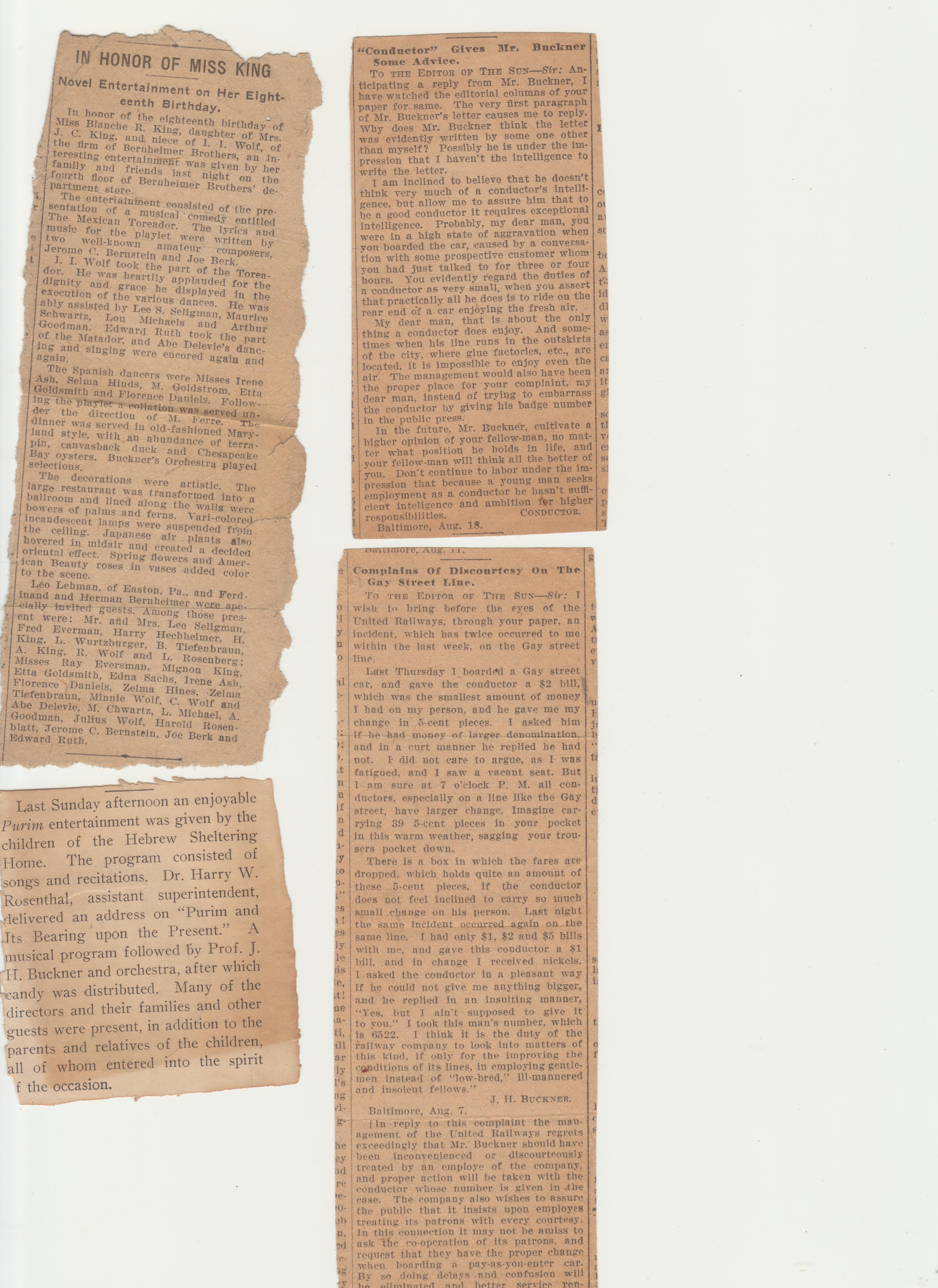 Jacob H. Buckner’s Civic Voice, Musical Activity, and Public Debates (Baltimore, 1914)
Jacob H. Buckner’s Civic Voice, Musical Activity, and Public Debates (Baltimore, 1914)
This set of news clippings continues to reveal the vivid public presence of Jacob H. Buckner, particularly around August 1914, in Baltimore’s civic discourse and Jewish community life. The documents reflect an articulate young man deeply engaged in debates on fairness, public decorum, and cultural leadership.
Key Observations:
- Prolonged Public Dispute: Buckner vs. the Streetcar Conductors
- This is a multi-day published debate in the Baltimore Sun.
- It began with Buckner’s frustration at the way streetcar conductors handled small change and their tone towards passengers.
- He repeatedly accuses them of rudeness, laziness, and a lack of public service mindset, calling out a sense of civic duty and respect for the public.
- The conductors’ replies show defensiveness and class resentment, implying that Buckner is privileged and doesn’t understand the grind of working-class men.
- In modern terms, this reads as a class-based microaggression battle between educated middle-class civility and overworked transit laborers.
- The Gay Street Line, specifically, appears to be the route that triggered Buckner’s frustration multiple times.
- Buckner’s Persistent Use of the Press
- He utilises the Baltimore Sun’s letters page as a platform for personal advocacy and public reform—something not many his age (likely early 20s) were doing.
- This makes Buckner something of a proto-citizen journalist or public intellectual in his community.
- Jewish Community Events: Orchestra and Cultural Life
- Buckner was active in orchestral performance, both for entertainment and ceremonial events like birthdays, holidays (e.g. Purim), and youth society functions.
- Miss King’s 8th birthday and the Hebrew Sheltering Home event reveal Buckner’s role not just as a musician, but also a symbol of culture, education, and progress within the Baltimore Jewish community.
🖋️ FULL TRANSCRIPTIONS
Top Left – IN HONOR OF MISS KING – Novel Entertainment on Her Eighth Birthday
Miss Blanche E. King, daughter of Mr. & Mrs. King, of 1117 E. Baltimore street, was the guest of honor at an entertainment given in her honor by her family and friends last evening, when she celebrated her eighth birthday.
The entertainment, under the direction of Prof. J. H. Buckner, consisted of the presentation of a musical and theatrical program. The motion of an amateur concert was completed with the talent of Miss Florence J. Rosenthal and Master Jerome Weil.
Several amateur performers contributed to the musical entertainment, and the affair was highly appreciated by those present. The dignity of the event is implied from the carefully written program.
Among the singers and performers were Miss Ida Herman, Bessie Nachlas and Goodman, and the little solo singers were Etta Goldsmith and Abe Delevie’s daughter, also singing were Florence J. Rosenthal, Bessie Nachlas and others.
Among the guests were Misses Irene Gold, Selina Hinds, Ida Goldstein, Fannie Kline and Edna Sachs. Also Miss Florence Daniels, Minnie Kline, Vera Zelik, Etta Goldsmith, Florence Kline and Ruth Goldstein. Among the boys were Harold Rosen, Joe Beck, Edward Ruth, Jerome C. Bernstein and Sam Wolfe.
The decorations were artistic. The parlors and hall were decorated with banners of red and white, and patriotic colored Japanese lanterns prevailed overhead. In lamps were red-colored globes, and the walls were strung with holiday buntings. The children’s orchestra under Buckner’s direction played several selections.
Bottom Left – Purim Entertainment
Last Sunday afternoon an enjoyable Purim entertainment was given by the children of the Hebrew Sheltering Home. The program consisted of songs and recitations.
Dr. Harry W. Rosenthal, assistant superintendent, delivered an address on “Purim and Its Bearing upon the Present.”
A musical program followed by Prof. J. H. Buckner and orchestra, after which candy was distributed.
Many of the directors and their families and other guests were present, in addition to the parents and relatives of the children, all of whom entered into the spirit of the occasion.
Top Middle – “Conductor” Gives Mr. Buckner Some Advice
To the Editor of The Sun—Sir:
Anticipating a reply from Mr. Buckner, I have watched the editorial columns of your paper for some time. The very first paragraph of Mr. Buckner’s letter causes me to reply. Why does Mr. Buckner make one letter when another reply is under consideration—was anybody privileged to say the other person can’t or hasn’t the intelligence to write the letter?
I am inclined to believe that he doesn’t think so highly of a conductor’s intelligence, yet much on us assures him that a good conductor requires exceptional intelligence. Probably, my dear man, you’ve been fooled more than once by a person who boarded the car, caused a confusion of words and said nothing more than you expected. You’ve yet to discover that a conductor’s memory is very small, even to ask for and recall all of his orders in the midst of a crowd.
Let me remind Mr. Buckner that not everyone has the time or courage to act as he does. He should think of the fatigued man who works 17 hours and must endure the abuse of people in the public press.
In the meantime, Mr. Buckner, cultivate a higher opinion of your fellow-men. If that is what position he holds in life, and your fellow-men will think all the better of you. Don’t locate blame on the soul.
I must believe the trouble was not with employment as a conductor but with self-respect, intelligence and ambition for higher responsibilities.
— Yours, A Conductor
Baltimore, Aug. 18
Bottom Right – Complains of Discourtesy on the Gay Street Line
To the Editor of The Sun—Sir:
I wish to bring before the eyes of the United Railways, through your paper, an incident, which has twice occurred to me within the last week, on the Gay Street Line.
Last Thursday I boarded a Gay Street car and gave the conductor a $2 bill, which was the smallest amount of money I had on my person, and he gave me my change in 5-cent pieces. I asked him if he had money of larger denomination.
The half-sarcastic answer repelled me, but I did not care to argue, as I was fatigued, and it was a repeat seat. But this occurred at 7 o’clock P.M., still another instance.
Surely all conductors, especially on a line like the Gay Street, have larger change. Imagine carrying 34 5-cent pieces in your pocket in this warm weather, sagging your torn-purse pocket down.
In a box in which the fares are dropped, which holds quite an amount of those 5-cent pieces, if the conductor sees a need, he could remove a stock of small change on his person.
Last night the same incident occurred again at the same line. I had only $1, $2, and 50¢ bills and gave this conductor a $1 bill and he changed it readily to nickels, again, because I remarked weakly, if he could not give me anything bigger, I need it. He replied he could not.
I took this up as another effort of the United Railways to destroy the dignity of its lines, in employing gentlemen of ill-temper, ill-breeding, and misuse of love.
— Yours, J. H. BUCKNER
Baltimore, Aug. 17
